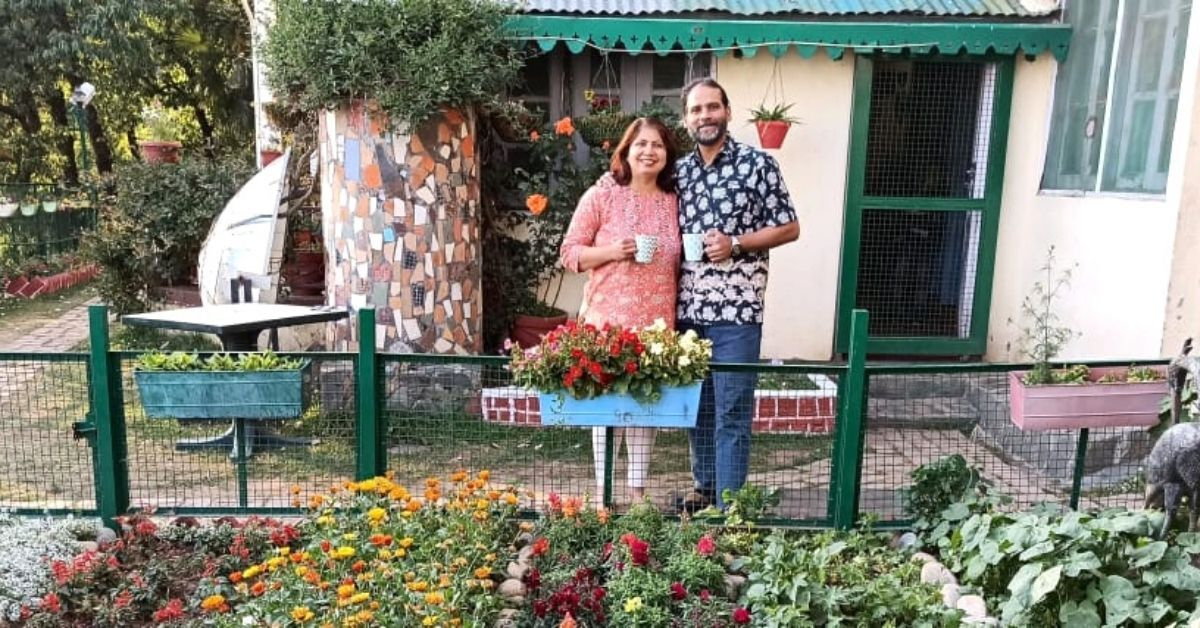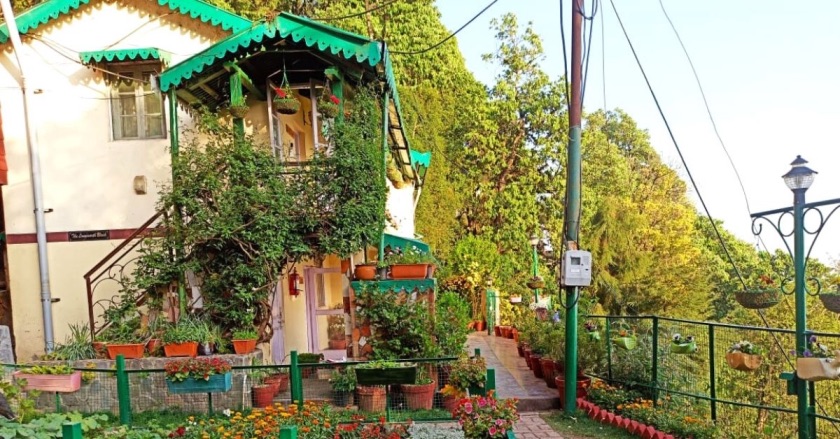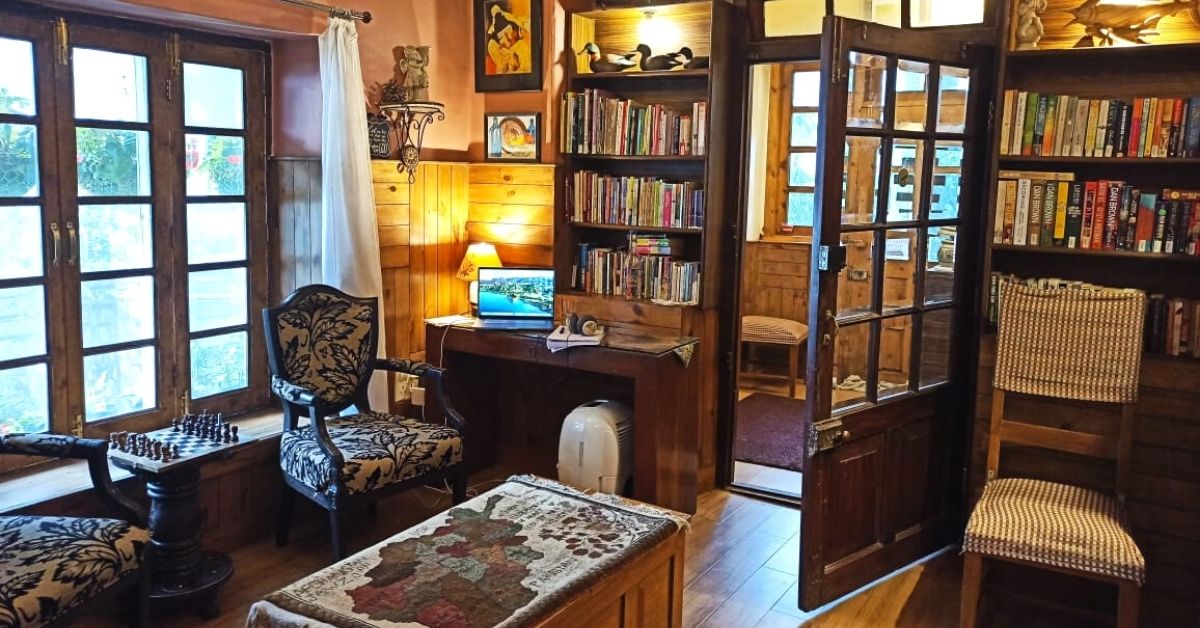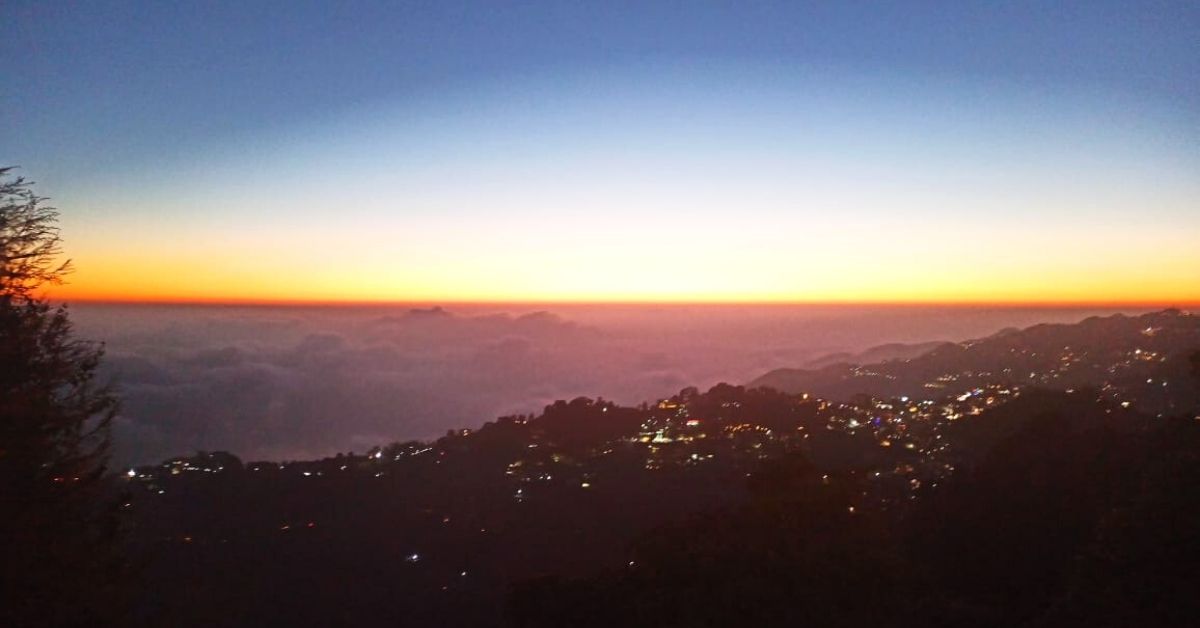‘Leaving Our Jobs, We Converted A 100-YO Building Into A Homestay In The Hills’
Sunita and Amarjeet quit their city lives to move to Landour, Uttarakhand and run 'La Villa Bethany', a rustic and beautiful homestay that features sustainability, lavish views and warm hospitality.

Imagine waking up in a homestay to fresh, crisp air every morning, without even the slightest hint of pollution. When you look out of your window, all you see are vast expanses of thick deodar forests, and if you happen to take a walk around the neighbourhood, you’re greeted by dense covers of rhododendrons, and magnificent sunsets that taper from yellow to scarlet skies.
To most of us, this sounds like a dream vacation. For Sunita, Amarjeet, and their daughter Srushti, this is just everyday life in Landour. It has been so for the past 11 years. This sleepy town, which once served as a British cantonment, is now perfect for charming views and much-needed respite from city life.
It all began when Sunita and Amarjeet visited the town for a short vacation. When they stumbled upon a dilapidated 100-year-old bungalow, it was love at first sight.
It only seemed natural that they quit their corporate lives altogether and convert this into a homestay, which is also now their permanent home. Today, the old building is very much alive in the avatar of ‘La Villa Bethany’, which hosts guests from across the globe.
A Fresh Start With a Homestay

Speaking with The Better India, Amarjeet says, “We both worked in the hospitality sector and lived in cities like Delhi and Mumbai, and had no qualms about our professional lives.”
With years of experience in working with a hospitality group, Amarjeet had bagged the position of regional learning and development manager with the British Foreign Common Office around 2005.
“It was one of those rare opportunities that allowed me to train people from nine South Asian countries, and I worked with people from different nationalities,” he says.
But, he notes, months of travelling and the fast-paced corporate world began taking a toll on the couple’s personal lives. “Sunita and I were already feeling suffocated with city traffic and the problems that come with overcrowding and unplanned development in cities. We were contemplating a better lifestyle, but we could not leave our jobs altogether,” he says.
In 2007, the couple was blessed with a daughter. “The feeling only grew stronger with Srushti’s birth, as we did not want her growing up in a city surrounded with pollution, disorder, and a poor and congested lifestyle,” he says.
With this feeling constantly brewing inside, in 2009, the family visited Landour for a vacation.
“We loved the place and felt at peace. One day, we found a colonial-era bungalow located along the slopes. A board obstructing its view mentioned that it was available for sale,” Amarjeet says.
“It was a beautiful structure, and we feared that the owner may demolish it for redevelopment. We learned that the bungalow was under the ownership of a missionary trust. The trust did not have the funds to maintain it, and had thus decided to do away with it,” he says.
He adds that the incident left a mark on him. “When we came home, we realised that neither of us wanted the property to be sold to an uncertain fate. We went back to the trust with a plan that suggested that the concerned persons lease the bungalow to us for setting up a homestay,” he says.
Sunita adds, “We promised to invest the money to restore and maintain it on behalf of the missionary. The prospect of a homestay stemmed from Amarjeet’s frequent trips abroad, where the concept is common. We thought the bungalow could serve as an ideal homestay for tourists.”
The missionary trust agreed to lease the property for 33 years. With this, Sunita and Amarjeet quit their respective jobs, sold their apartment in Mumbai, and liquidated stocks to raise capital for the restoration work.

‘Never missed city life’
“There are nine rooms at the property, we kept three for ourselves and converted the remaining into guest rooms,” she says. “We fought extreme weather in the mountains, battled chilly nights, and struggled with logistics to establish the property. Finally, it was ready to welcome guests in May 2011.”
Since then, thousands of visitors from far corners of the globe have visited them, and places are often sold out, making it difficult to find a booking most of the time in a year. “We have even had guests from the Barrow, the last habitable village in the arctic,” she says.
At La Villa Bethany, sustainability is an integral part of daily life. “We have set up a rainwater harvesting system with a capacity of 1.3 lakh litres for our daily use. We use a solar heater with a capacity of 1,000 litres to heat water and cook food,” she says.
The couple says that every item used in the homestay is sourced from an organisation working with underprivileged women in Uttarakhand — from toiletries to carpets, bed covers, and more. Being located in the Himalayas, La Villa Bethany only employs youth from the mountains. Some services are outsourced to other locals, thereby creating more indirect employment, Sunita says, adding that she is also the secretary of Keeping the Environment Ecologically Neutral (KEEN), an organisation which manages the entire waste generated in Mussoorie and employs over 140 people, mostly women.
In addition, the homestay supports local communities and NGOs. “We believe in long term rehabilitation of the residents and support projects and initiatives that help them break out of the poverty cycle. Our experience living in rural parts has made us realise that these people are stuck in the intergenerational poverty cycle. Hence, we make conscious efforts to bring people out of it,” Sunita says.
“We segregate dry and wet waste of which the dry is processed at KEEN, while the latter is treated at the source,” she adds.
The couple says they did not have any marketing budgets or skills to promote their homestay, and that word of mouth helped them attract visitors. “We never treat guests as outsiders. All of us have dinner on a single dining table like a family. There have been occasions where the electronic card swipe has not functioned due to network issues for payments, and we trusted that they wire the money once they reach home. Fortunately, we have never been duped,” she says.
Sunita explains that another peculiarity of the homestay is that three generations of women live in the house. “Many single women travellers working in the corporate sector or groups wanting to celebrate an occasion choose the homestay as they feel safe staying with me, my daughter, and my mother-in-law,” she says. “No outsiders are allowed in our restaurants which creates a safe environment for women.”

She also says that a majority of visitors are repeat clientele, who come as guests but return as family members. “There have been occasions when people have met for the first time at our dinner table and became lifelong friends or partners. These are little joys we receive from our homestay that come out of our objective to give meaningful experiences to the guests.”
The couple says they have also helped the villagers during the Uttarakhand flash floods by training them in sustainable practices, among other occupations related to animal husbandry, agriculture and forestry. “It is a way of sharing our blessings with the lesser privileged,” she says.
Sunita says that they have also helped five other people establish successful homestays. “We handhold them during the initial years until they become self-reliant.”.
Amarjeet says the family aims to continue serving guests and help the poor through their homestay. As of now, they have no plans to return to city life. “In all these years, we have lived a healthier and less complicated lifestyle. I can say for sure that we have never missed city life,” he adds.
For enquiries and bookings, click here.
Edited by Divya Sethu
If you found our stories insightful, informative, or even just enjoyable, we invite you to consider making a voluntary payment to support the work we do at The Better India. Your contribution helps us continue producing quality content that educates, inspires, and drives positive change.
Choose one of the payment options below for your contribution-
By paying for the stories you value, you directly contribute to sustaining our efforts focused on making a difference in the world. Together, let’s ensure that impactful stories continue to be told and shared, enriching lives and communities alike.
Thank you for your support. Here are some frequently asked questions you might find helpful to know why you are contributing?


This story made me
-
97
-
121
-
89
-
167













